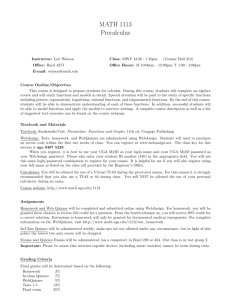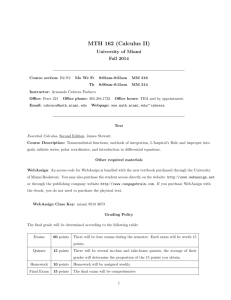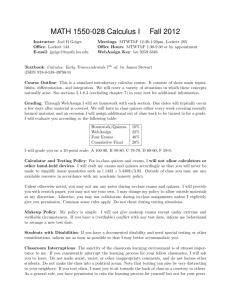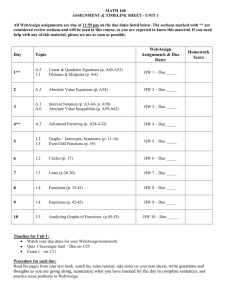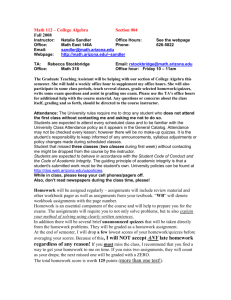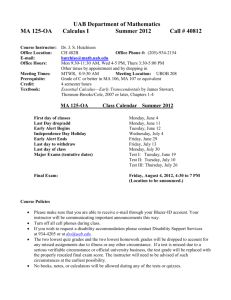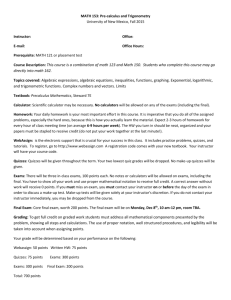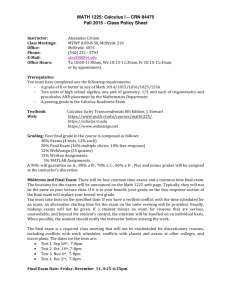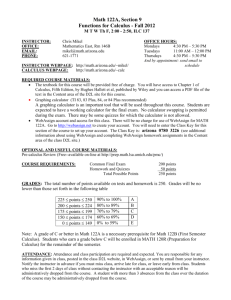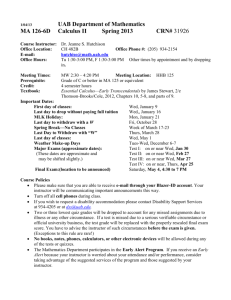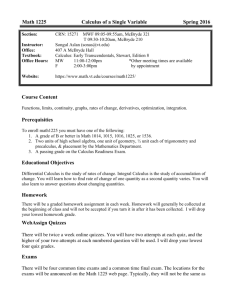Syllabus - Ben Russo
advertisement
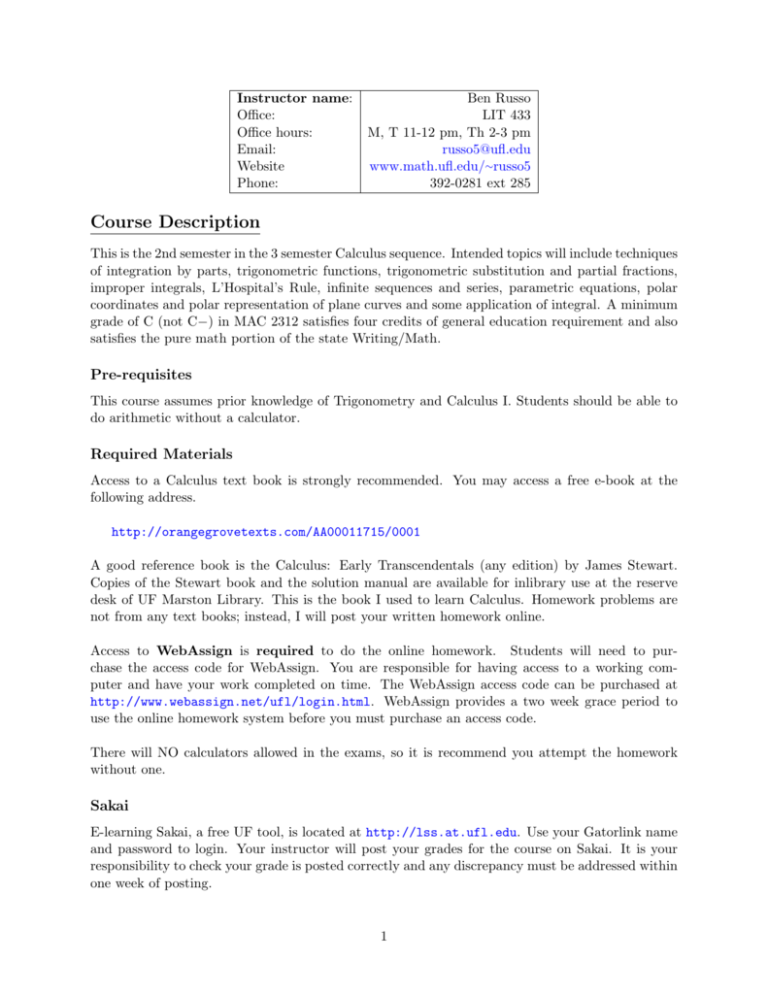
Instructor name: Office: Office hours: Email: Website Phone: Ben Russo LIT 433 M, T 11-12 pm, Th 2-3 pm russo5@ufl.edu www.math.ufl.edu/∼russo5 392-0281 ext 285 Course Description This is the 2nd semester in the 3 semester Calculus sequence. Intended topics will include techniques of integration by parts, trigonometric functions, trigonometric substitution and partial fractions, improper integrals, L’Hospital’s Rule, infinite sequences and series, parametric equations, polar coordinates and polar representation of plane curves and some application of integral. A minimum grade of C (not C−) in MAC 2312 satisfies four credits of general education requirement and also satisfies the pure math portion of the state Writing/Math. Pre-requisites This course assumes prior knowledge of Trigonometry and Calculus I. Students should be able to do arithmetic without a calculator. Required Materials Access to a Calculus text book is strongly recommended. You may access a free e-book at the following address. http://orangegrovetexts.com/AA00011715/0001 A good reference book is the Calculus: Early Transcendentals (any edition) by James Stewart. Copies of the Stewart book and the solution manual are available for inlibrary use at the reserve desk of UF Marston Library. This is the book I used to learn Calculus. Homework problems are not from any text books; instead, I will post your written homework online. Access to WebAssign is required to do the online homework. Students will need to purchase the access code for WebAssign. You are responsible for having access to a working computer and have your work completed on time. The WebAssign access code can be purchased at http://www.webassign.net/ufl/login.html. WebAssign provides a two week grace period to use the online homework system before you must purchase an access code. There will NO calculators allowed in the exams, so it is recommend you attempt the homework without one. Sakai E-learning Sakai, a free UF tool, is located at http://lss.at.ufl.edu. Use your Gatorlink name and password to login. Your instructor will post your grades for the course on Sakai. It is your responsibility to check your grade is posted correctly and any discrepancy must be addressed within one week of posting. 1 Course Breakdown Written Homework In-Class Quizzes WebAssign Homework Participation Tests Final Total 50 80 30 20 300 120 600 points points points points points points points Written Homework There will be 5 assignments worth 10 points each, collected on the dates to be announced. These assignments will be graded on both completion and accuracy. No late homework will be collected after the solutions are posted. In-Class Quizzes There will be 10 in-class quizzes on the dates indicated on the calendar, each taking approximately 20 minutes. The highest 8 scores will be counted towards your grade. WebAssign Homework There will be 5 assignments worth 6 points each. Participation Participation points will be dealt with at the discretion of the instructor. This may include but is not limited to, pop-quizzes, attendance checks, or group work. The purpose of these points is to encourage attendance. Tests There will be 3 exams over the course of the semester, each worth 100 points, on the dates indicated below and on the calendar. The exams are 90 minutes and are given at night. Your instructor will inform you of the times. Exam 1 Exam 2 Exam 3 June 5th July 17th August 1st Final A 2 hour comprehensive final exam worth 120 points will be given on August 8th. Your instructor will inform you of the time. 2 Grade Scale Points 540 – 600 (90%) 522 – 539.49 (87%) 504 – 521.49 (84%) 480 – 503.49 (80%) 462 – 479.49 (77%) 444 – 461.49 (74%) 420 – 443.49 (70%) 402 – 419.49 (67%) 384 – 401.49 (64%) 360 – 383.49 (60%) 342 – 359.49 (57%) 0 – 342.49 (below 57%) Grade A A− B+ B B− C+ C C− D+ D D− E Make-ups Exams There will be make-up exams given at the end of the semester for students who miss exams for valid reasons. In general, acceptable reasons for absence from class include illness, serious family emergencies, special curricular requirements (e.g., field trips, professional conferences), military obligation, severe weather conditions, religious holidays and participation in official university activities such as music performances, athletic competition or debate. Absences from class for court-imposed legal obligations (e.g., jury duty or subpoena) must be excused. Other reasons also may be approved. In addition, if you are already aware of a conflict with an exam date, then you need to discuss this with your instructor within the first two weeks of class (before May 27th). The date of this make-up exam is to be scheduled later. Quizzes The first two quizzes you miss will be considered your dropped quizzes. If you miss a third quiz, you are allowed to make it up, provided you have legitimate documentation for all three absences. WebAssign There will be no makeups allowed for WebAssign as there will be ample time to complete the assignment. This entails that you make sure you have no technical issues with your homework and that is was submitted correctly. Incompletes Students who are currently passing and have sucessfully completed a majority of a course but are unable to complete the course because of illness or emergency may be granted an incomplete grade of “I” which will allow the student to complete the course within the first two weeks of the following semester. Note that incomplete grades are limited to those students who can verify and document a valid reason for not being able to take the final exam. If you meet the criteria and you wish to 3 take an incomplete grade, you must see the instructor during office hours before finals week to be considered for an “I”. A grade of “I” only allows you to make up your incomplete work, not redo your work. Students with Disabilities UF welcome students with disabilities into the UF programs. If you have a disability and need accommodations in this course, contact the office of Disability Resources Center (352-392-8565, www.dso.ufl.edu/drc). The DRC will provide documentation to the student who must then provide this documentation to the instructor. Academic Honesty All students are required to abide by the Academic Honesty Guidelines which have been accepted by the University. The academic community of students and faculty at the University of Florida strives to develop, sustain and protect an environment of honesty, trust, and respect. Students are expected to pursue knowledge with integrity. Exhibiting honesty in academic pursuits and reporting violations of the Academic Honesty Guidelines will encourage others to act with integrity. Violations of the Academic Honesty Guidelines shall result in judicial action and a student being subject to the sanctions in the Student Code of Conduct. The conduct set forth hereinafter constitutes a violation of the Academic Honesty Guidelines (University of Florida Rule 6C1-4.017). Any suspicious activity during quizzes or exams or plagerism on the homework will be considered as cheating and violators will be taken to honor court where you may face automatic failure or even expulsion. At the very least, you will receive a zero for the assignment/ assessment and you will not be allowed any additional attempts. 4

